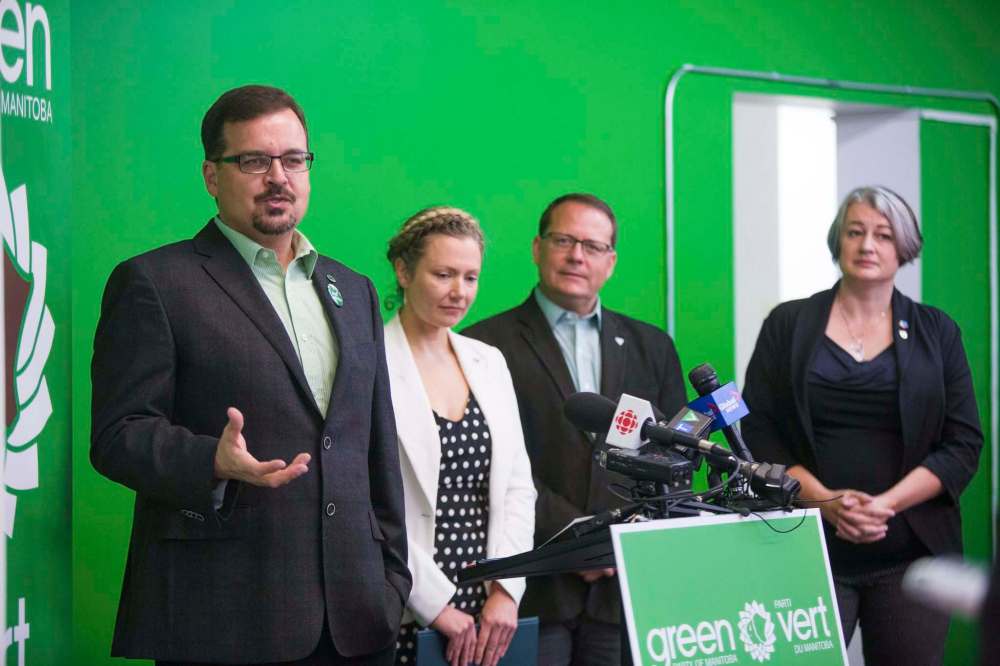Greens promise to change electoral system, lower voting age to 16
Advertisement
Read this article for free:
or
Already have an account? Log in here »
To continue reading, please subscribe:
Monthly Digital Subscription
$1 per week for 24 weeks*
- Enjoy unlimited reading on winnipegfreepress.com
- Read the E-Edition, our digital replica newspaper
- Access News Break, our award-winning app
- Play interactive puzzles
*Billed as $4.00 plus GST every four weeks. After 24 weeks, price increases to the regular rate of $19.00 plus GST every four weeks. Offer available to new and qualified returning subscribers only. Cancel any time.
Monthly Digital Subscription
$4.75/week*
- Enjoy unlimited reading on winnipegfreepress.com
- Read the E-Edition, our digital replica newspaper
- Access News Break, our award-winning app
- Play interactive puzzles
*Billed as $19 plus GST every four weeks. Cancel any time.
To continue reading, please subscribe:
Add Winnipeg Free Press access to your Brandon Sun subscription for only
$1 for the first 4 weeks*
*$1 will be added to your next bill. After your 4 weeks access is complete your rate will increase by $0.00 a X percent off the regular rate.
Read unlimited articles for free today:
or
Already have an account? Log in here »
Hey there, time traveller!
This article was published 01/09/2019 (2221 days ago), so information in it may no longer be current.
Not only would a Green provincial government lower the voting age to 16 — it would also reform the way Manitobans vote altogether, the party promised Saturday.
Green Party of Manitoba candidates promised Saturday morning during a press conference at the party’s headquarters that if elected Sept. 10, their party would reform the electoral system to implement proportional representation in future elections.
“So many Manitobans don’t vote because they feel like their vote doesn’t matter – that is a sign of an unhealthy democracy,” said deputy leader Andrea Shalay, who is running to represent the party in Union Station.

That’s why Shalay and Wolseley candidate David Nickarz, alongside visitors MLA Hannah Bell from the party’s P.E.I. affiliate and Mike Schreiner from Ontario — the first Green to be elected as an MPP in Ontario’s legislature — said they would implement a mixed-member proportional representation system in Manitoba.
Under this system, 50 of 57 seats would be allocated by the traditional first-past-the-post system. However, the remainder would be filled based on each party’s share of the popular vote.
The party said it would not hold a referendum for Manitobans on the change and promised an immediate reform.
“Our current system allows a minority of people to have a majority government and that leads to unchecked power and decision making, unbalanced debate and no listening to other perspectives and often, to the very people being affected by these decisions,” Shalay said.
She added that the current system “deepens partisan divides” because it prioritizes parties over policies and people.
There have yet to be any Green politicians elected to represent constituents in Manitoba’s legislature. If such a system were in place three years ago, the Greens said the party could have won three seats in the 2016 provincial election.
When Nickarz took the mic, he said the change would eliminate strategic voting in the province. “People would vote for who they want, not the least worst candidate,” he told reporters.
The Greens also pledged to allow more free votes in the legislature, require the premier to hold at least two public town hall meetings per year and respect fixed election dates. As well, it said it would lower voting age requirements.
“This is their future that we’re playing with here. We need younger people not only be involved in decision making but if you vote when you’re younger, it’s likely that you’ll vote more in the future,” Nickarz said.
When pressed on the referendum, he noted the prime minister’s 2015 win on a campaign to get rid of the first-past-the-post system.
Electoral reform was one of Prime Minister Justin Trudeau’s flagship promises in the last federal election. Trudeau abandoned his commitment two years into his leadership, citing a national survey that didn’t find a consensus on what Canadians wanted their voting system to look like.
Since then, B.C. and P.E.I. have held provincial referendums on electoral reform, both of which did not pass.
“At this point, we’re past the point of referendum,” said Bell.
She added standards for referendums are unjustly higher than those for elections.
maggie.macintosh@freepress.mb.ca
Twitter: @macintoshmaggie

Maggie Macintosh
Education reporter
Maggie Macintosh reports on education for the Free Press. Originally from Hamilton, Ont., she first reported for the Free Press in 2017. Read more about Maggie.
Funding for the Free Press education reporter comes from the Government of Canada through the Local Journalism Initiative.
Every piece of reporting Maggie produces is reviewed by an editing team before it is posted online or published in print — part of the Free Press‘s tradition, since 1872, of producing reliable independent journalism. Read more about Free Press’s history and mandate, and learn how our newsroom operates.
Our newsroom depends on a growing audience of readers to power our journalism. If you are not a paid reader, please consider becoming a subscriber.
Our newsroom depends on its audience of readers to power our journalism. Thank you for your support.





